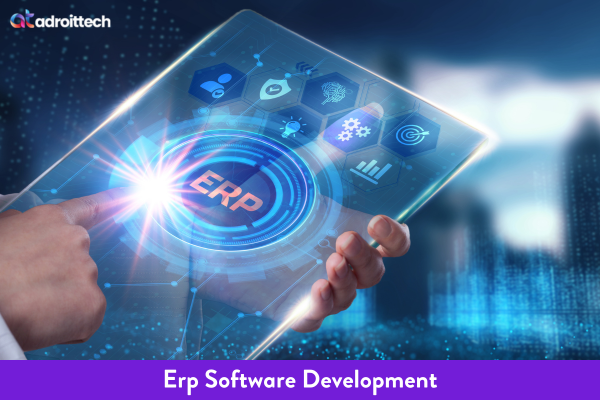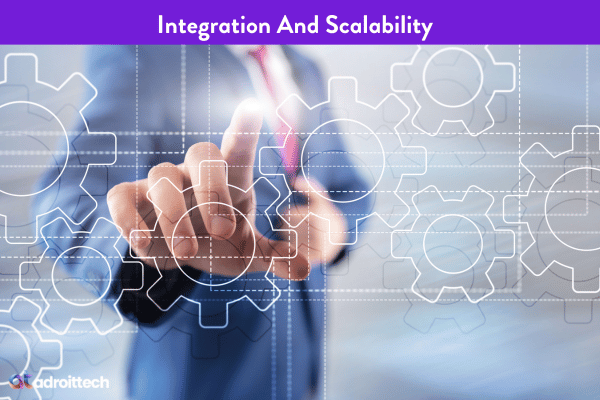Erp Software Development
Leading Custom Software Development Services
Premier Software Development
Enterprise Resource Planning is a sort of software that enables businesses to manage and integrate their essential activities. These processes frequently include finance, human resources, supply chain, manufacturing, procurement, and other areas critical to the operation of a business. ERP software often has a centralized database that accommodates several functions needed by various business divisions. It enables the smooth flow of information across different units, resulting in improved communication and collaboration within the organization. ERP systems may automate several jobs, streamline processes, and provide insights via analytics and reporting capabilities.

Automates core financial processes like accounts payable/receivable, general ledger, and tax management. It helps consolidate financial data and generate reports for better financial decision-making.
This module automates HR processes such as payroll processing, talent management, benefits administration, and employee training. It also supports leave management and attendance tracking.
This section deals with production procedures. It is capable of managing bills of materials, production scheduling, shop floor control, and quality control. It enables enterprises to improve production efficiency and meet client demand.
This module helps manage all interactions with customers. It allows businesses to track sales leads, manage customer accounts, create marketing campaigns, and provide customer service.
Integration And Scalability
Software that feels magical

Integration and scalability are two critical elements of good ERP software because they have a direct impact on a company’s capacity to work efficiently and respond to change.
ERP software acts as a central hub, integrating data from various departments like finance, HR, and inventory. This eliminates information silos, where departments work with separate data sets, leading to inconsistencies and inefficiencies. With integrated data, different departments can access and share information seamlessly. This fosters better collaboration, as everyone has a unified view of the business operations.
A scalable ERP can adapt to accommodate a growing business. This could involve adding new users, managing increased data volumes, or integrating with new applications as the business evolves. These systems often avoid the need for expensive rip-and-replace implementations when a business expands. They can be modular, allowing businesses to add functionalities as needed, optimizing costs.
Functionality
ERP software can be tailored to specific industries. These industry-specific versions come ready-made with features that fit the way that particular business sector works. For instance, a manufacturer would get an ERP system with tools for scheduling production runs, keeping track of factory activity, and ensuring quality control. On the other hand, an ERP system designed for healthcare would focus on managing patients, keeping electronic health records, and following regulations.
Customization
ERP software can be tailored to specific industries. These industry-specific versions come ready-made with features that fit the way that particular business sector works. For instance, a manufacturer would get an ERP system with tools for scheduling production runs, keeping track of factory activity, and ensuring quality control. On the other hand, an ERP system designed for healthcare would focus on managing patients, keeping electronic health records, and following regulations.
Reporting and Analytics
ERP solutions often provide industry-specific reporting and analytics features. They may feature industry-specific KPIs (Key Performance Indicators) and dashboards that provide insights into performance and trends related to that industry.
Testing
Vigorously test the developed software to identify and fix bugs or defects using unit testing, integration testing, user-acceptance testing, and system testing to ensure the software meets quality standards.
Introducing AI for advanced functionality
There are several ways to add AI capabilities to ERP software, and the specific approach will depend on the functionalities businesses want to achieve and the resources available.
Predictive Analytics: AI can evaluate previous data to forecast future patterns such as demand or equipment breakdown.
Intelligent Automation: AI-powered bots to handle repetitive tasks such as data entry, invoice processing, and customer support inquiries.
Natural Language Processing (NLP): ERP systems can be made more user-friendly by allowing interaction through voice commands or written questions via NLP.
Adding Blockchain to ERP systems
Integrating blockchain technology into ERP software can provide several benefits such as enhanced security, transparency, immutability, and decentralized data management.
Why Choose Adroit Tech ?
Technical experience and expertise
Our team at Adroit Tech has ample expertise in ERP technologies, programming languages, databases, and development frameworks. We have Full Stack developers who are great at both front-end and back-end work. Our Python developers create advanced software using the latest AI and ML technology. We also have web and mobile app developers who make engaging and easy-to-use digital products. Plus, we know how to use cloud platforms like AWS, GCP, Microsoft Azure, and SAP BTP to build and manage applications that are scalable, reliable, and secure.
Scalability and Future-Proofing
ERP solutions need to scale with your business as it grows and evolves. Adroit Tech provides a scalable architecture and future-proofing strategies to accommodate future changes and expansions.
Quality Assurance and Testing
Adroit Tech follows best practices in software development, quality assurance, and testing. We have robust testing processes in place to ensure the reliability, performance, and security of an ERP solution.
FAQs
ERP is a software system that lets you manage your entire organization by automating and streamlining activities in finance, human resources, manufacturing, supply chain, services, procurement, and other areas.
Every business is unique, so ERP development phases may vary somewhat depending on the company, and they also may overlap. ERP software development involves six key stages: discovery and planning, design and architecture, development, testing, deployment, and post-production support.
The components of an ERP system differ based on the organization’s demands. However, there are some aspects that any ERP should have. Essential modules typically include finance, human resources, logistics and manufacturing, supply chain management, and customer relationship management.
As each ERP software is distinct in its objectives and specifications, the expenses associated with each project highly differ based on factors such as time invested, resources utilized, and infrastructure required. Adroit Tech offers a complimentary 30-minute consultation to provide a detailed quotation for your tailored ERP solution. During this session, you can outline your requirements and business objectives, receiving an appropriate estimate in return.